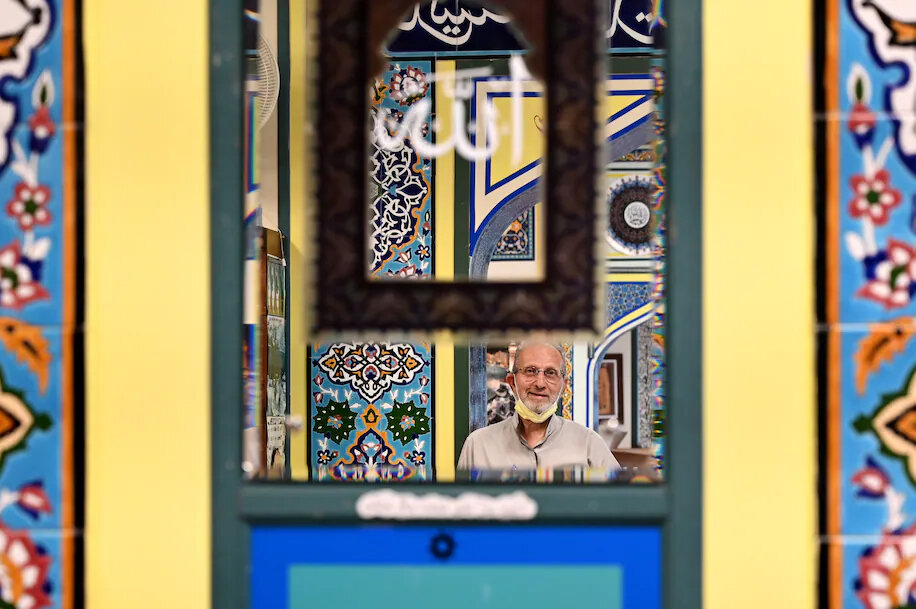U.S. releases religious tiles after confiscating them for violating Iran sanctions

TEHRAN - The U.S. Treasury Department has released a shipment of religious tiles that were projected to be installed at a northern Virginia mosque but were confiscated at Dulles International Airport after they were determined to have violated sanctions on Iran.
Engraved with verses from the Holy Quran, the custom-made tiles had been imported from the Iranian holy city of Qom to embellish a mihrab, a niche in the wall of a mosque or a room that points toward the direction of Mecca, Islam’s holiest site and the direction worshipers face when they pray.
Months ago, Imam Abu Nahidian, the religious leader at Manassas Mosque in northern Virginia, had wanted to create the niche with a specific design in mind for his mosque, which has been active since 1994. According to the Washington Post, he told a mosque in Iran what he was looking for, and people there agreed to help create the tiles for the niche, which is roughly 8½ feet long by 9 feet high. The work took six months. The tiles arrived at Dulles Airport in June.
However, earlier this week, he rushed to Dulles International Airport to pick up 17 tightly sealed boxes. “After months of waiting, Nahidian was grateful to finally have the shipment in his hands. Inside were 750 pounds of handmade tiles painted dark blue, turquoise, yellow, orange, brown, and yellow, with Quranic scripture at the top in white.”
The U.S. has imposed a variety of sanctions on the Islamic Republic since 1979, and “the tiles’ provenance triggered a standoff with Muslim advocates that ended Monday when Treasury Department officials said they had agreed to release them after threatening to destroy or re-export them.”
“But when Nahidian went to retrieve them, a U.S. customs official told him the shipment violated U.S. sanctions on Iran and refused to release them. Nahidian said he tried to explain that the tiles were a gift and were not purchased. As he understood the rules, the sanctions apply to products for sale. But the customs official was not persuaded and withheld them,” the American daily said on Saturday.
The U.S. Customs and Border Protection cargo office at Dulles Airport later told Nahidian in an email that the tiles would have to be sent back to Iran or destroyed. Under federal rules and regulations, to get tiles from Iran, the mosque needed to get permission from the Office of Foreign Assets Control of the Treasury Department.
“Nahidian says he was surprised — the mosque has received tiles from Iran before without any problem or any requirement of such a permit.”
The last batch had arrived just eight months earlier. The process to get the license for the tiles for the niche would probably take months, Nahidian recalled being told at the time. So he sought help from the Council on American-Islamic Relations (CAIR), a leading Muslim civil rights and advocacy organization, and hired an attorney, Saeid B. Amini.
Amini filed a request for the necessary license in late July. Initially, he tried to argue that the shipment was a gift under $100 since an Iranian mosque had donated the tiles to the mosque in Virginia. That argument typically would be enough to secure an import approval under federal guidelines, but it wasn’t successful, he said in an interview.
In August, Amini filed a request for the license to be expedited because it was a religious issue; the mosque needed the tiles quickly so it could start work on the niche. Mosque leaders also wanted to get the shipment out of the hands of customs so the tiles would not be destroyed.
Meanwhile, CAIR and the mosque’s leadership pressed publicly for the Department of Homeland Security and the Treasury Department to release all the boxes. CAIR officials called on the U.S. government to release the tiles because they are used for religious purposes.
“The tiles are religious items; they’re not weapons of mass destruction subject to sanctions,” CAIR Director Nihad Awad said at a news conference on Aug. 10.
“Regardless of the politics of the sanction policies of the U.S., we’re talking about common sense,” Awad continued. “Laws do have common sense when it comes to the application. This situation is the victim of bureaucratic complications and a lack of leadership to make a decision.”
On August 16, the Treasury Department granted the mosque a license to import the tiles into the United States. Nahidian went to the airport with the paperwork in hand, showed it to a customs agent, and transferred the 17 boxes into a car. U.S. customs agents had reinspected the boxes before they handed them off. There was no damage to any of the tiles, he said.
A spokesperson for the Treasury Department said that the agency broadly prohibits items from Iran without a license, and once Nahidian had one, the department handed the tiles over, the daily said.
AFM
